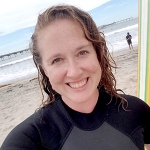When the Current, Future, and Aspiring PhDs and EdDs NIRSA discussion group formed in the summer of 2018, Jarrell Garcia—Assistant Director for Operations at the University of California-Santa Barbara—posed the first question to the group: “Is the juice worth the squeeze?” Jarrell received a number of public and private responses to the question; but, as more and more collegiate recreation folx are considering whether or not to pursue doctoral degrees, it seemed a thoughtful and timely question that others would stand to benefit from exploring.
For those of you contemplating pursuing a terminal degree, this article includes reflections, challenges, and advice about the doctoral process from five professionals across NIRSA.
Meet the contributors
Advice: Start with your why
The first thing to consider when entering a doctoral program is your why. What’s motivating you to invest a significant period of your life—and no small amount of resources—into becoming an expert on what is ultimately a relatively narrow topic?
Dr. Kell and I admittedly pursued our degrees with a long-term career goal in mind. We both started our programs believing a terminal degree is a necessary step on the path to becoming a Vice President of Student Affairs (VPSA). Pursuing a doctoral degree in leadership studies or other facets of higher education will certainly give you a stronger understanding of the theoretical schemas that underpin college and university administration. But, as any VPSA job posting will make clear, that theoretical understanding alone isn’t enough to land such an important position on campus; it needs to be complemented with practical application and experience (which can be more difficult to develop given the rigors of doctoral programs).
The other three professionals cited more academic purposes for their pursuit of terminal degrees. Dr. Sarah Hardin says she started initially because she “thought it would be interesting.” She adds, “While my early degrees were focused on sports and physical activity, I found my favorite part of being a collegiate recreation professional was seeing the growth and development of students. Pursuing a PhD in Higher Education allowed me to gain more insight into student learning as well as university culture and structure.”
Dr. Gabby McCollum became interested in pursuing a PhD through reading the Recreational Sports Journal—the scholarly journal for the profession—while she was the Aquatics Program Director at Georgia Southern University. There she developed an interest in how data could inform her work connecting campus recreation experiences with indicators like retention, progression, and graduation rates for students.
Greg Reinhardt, currently in the final year of his program, is seeking his EdD as a challenge for his own personal growth and to make himself “a more well-rounded candidate for higher-level positions.”
All five of us share a love of learning—it’s difficult to imagine successfully finishing a doctoral program without a general inquisitiveness and underlying passion for investigation (university-speak for reading and writing). But, in retrospect, ultimately the differences in our initial rationale for starting a program may have affected our feelings about the overall worth of our degrees.
Advice: Be flexible
Before entering a doctoral program, we all agree it’s good to be aware that even if you know your why right now, it might change during the course of completion. While Sarah, Gabby, and Greg say their purposes for starting their programs remained largely consistent, both Yvette and I experienced changes in what motivated us to complete our degrees. We entered our programs motivated by our goals of strengthening our candidacy for VPSA positions.
“By the end,” Yvette says, “I just wanted to finish.” A little more than one year on from completing her degree requirements, she’s still considering what her next steps might be: “right now, I’m concentrating on growing my job and exploring ways of utilizing my PhD through committee work and teaching opportunities,” she adds.
During my program, I came to realize that it would be very difficult to make my way into a VPSA role while also maintaining a commitment to modelling the healthy behaviors we advocate for through collegiate recreation. I also discovered just how much I loved the field of collegiate recreation. I also started to feel disheartened by what I perceived to be a general disregard for the value of the collegiate recreation profession—a position many of my classmates in the Leadership Studies Program held.
Challenges: Navigating academia
All five of us experienced a variety of challenges, but we all agreed that learning to operate in academia requires different skills and sometimes values. Academic research and writing have similarities to assessment and professional writing, but there are conventions and intricacies that take time to learn and integrate at the level expected of doctoral candidates.
A big part of the challenge is deciding on a very narrow topic within a huge area of interest. Then there’s the time-consuming nature of locating literature that will support your research—but not so well that it makes your own research claims irrelevant. And you absolutely need to find time to write and write and write. (And to revise and revise and revise.) Oh, and you’ll be expected to navigate relationships with committee members who have other responsibilities and priorities that may impact your ideal timeline.
Greg and I also experienced frustration that grew out of discovering that classmates and even members of faculty didn’t understand or accept the value of collegiate recreation.
Finding enough hours in a day to meet the strenuous demands of a doctoral program can be a real challenge in and of itself; don’t forget that you’ll be expected to balance it all with other responsibilities like family, friends, work, keeping good nutrition habits, and getting enough sleep and exercise.
Reflections: Don’t be fooled
Getting a doctorate degree is hard by design. It’s a terminal degree and very few people in the world have one. The U.S. Census Bureau reported in 2018 that only 4.5 million of the nearly 254 million adult residents (or a little less than 2% of the population) had a doctorate degree.
Earning a doctorate is supposed to be a very challenging process where current experts in the field assess nearly every aspect of your reasoning, critical thinking, application of research methods, writing, and formatting skills to decide if you have the academic skills that warrant the title of doctor.
There are tedious steps in the process that feel like hoops to jump through even though you’ve completed all the hard stuff. We share all of this to say: If you’re considering entering a doctoral program, be sure you think through some realistic strategies to ensure the wellbeing of you, your loved ones, and your important social relationships throughout the program. Be sure to give yourself time and space to think through your financial, social, emotional, and physical needs.
Advice: Consider the costs
If you are considering a program, consider the full scope of the obligations involved—both the time constraints and financial obligations for attending full-time versus part-time. It’s important to know the timing of required and elective classes—does the program you’re applying to generally hold classes during the day, during the evenings, or on weekends? Class schedules will impact your ability to work and earn income. It takes time to look for graduate assistantship opportunities and scholarships in your field; but it’s a time investment that may really pay off in the end. And even if you don’t receive any financial support for your efforts, the practice in researching and fulfilling administrative requirements will be helpful down the line.
I personally experienced extreme financial hardship because I didn’t fully understand my program’s financial support. To make ends meet and ensure that my résumé reflected continuous professional growth, I ended up working four jobs (all of which were off-campus).
The combination of financial pressures with academic rigors can easily make for a very stressful few years, particularly at the end of the program when institutional funding can become more difficult to secure.
Reflections: Success requires support
Consider the impact your pursuits will have on your family and friends. You will inevitably be less available, which can strain relationships of all kinds. We found that our absences were less understood by individuals who had no say in our decisions to pursue terminal degrees and may not understand the intensity of a doctoral program.
Consider how you will care for yourself and those in your household. Do you have a strategy for meals, physical activity, sleep, and all of the human needs that are already difficult to manage in the best of times? Especially in the final stages, doctoral work involves long, lonely stretches in front of a computer. You’ll suffer from less and less flexibility around meeting deadlines—students are often subject to the limitations in their committee members’ schedules.
For the five of us, social supports and determination were among the most important factors in persisting. Those supports included partners, friends who had already been through a program, and regular connections with classmates in our respective cohorts. Some of us were fortunate to have loved ones who could help us with the everyday tasks of life, such as preparing meals or running errands. Some of us had financial support from partners or parents. Some had close relationships with classmates and regular time for connection and checking in on each other’s progress. Some of us found emotional support through a counselor or therapist, someone with whom we could share our struggles without feeling like too much of a burden on loved ones.
With all of that said, four of us, with varying degrees of support and planning, made it through, and one more is almost there. The doctoral process is challenging, but it is temporary and it is doable. All of us seemed to share the attitude that says, “I finish things,” as Sarah puts it, which helped us through this process. But we do not all agree about whether it is worth it.
Reflections: Is the juice worth the squeeze?
Greg and Gabby both enthusiastically say that YES! The juice is absolutely worth the squeeze. Greg says, “I feel fulfilled in my program and I believe I have gained valuable educational insight to be a better professional. I understand this is an investment for my future and I fully embrace the grind each week.”
Gabby adds, “In the wake of finishing my degree, I was given one more person to report to me and a salary increase. If I’m thinking about the future, I think this degree will open many doors for me.” Gabby and Greg both have confidence that their degrees will help them advance their careers in the field. Yvette and I are still unsure: “I can’t answer that it has been worth the squeeze just yet,” Yvette says. “Right now, I would say no; but I’m still pretty raw from the whole experience. I’m sure it’ll be worth it once I get over the crappiness of the experience.”
I too had some crappy experiences and Yvette’s words resonate with me. It’s hard to consider the value of an experience when the negative effects are still lasting.
Sarah had a slightly mixed perspective: “It depends on how you look at it. Financially—probably not; I don’t think I’ve made more money really than I would have had I just stayed in the field as a practitioner. But I gained a lot of knowledge and experiences that I would hate not to have,” she says. “So I’m glad I did it and ultimately it was worth the squeeze to me. I think it depends on your purpose for doing it.”
Personally, by the time I fully realized the costs of the degree–financially, emotionally, socially—I’d probably have said it isn’t worth it. However, I was so far in by the time I reached that realization that I knew I would never be able to pay back my student loans if I didn’t somehow finish and use this degree for financial security.
Reflections: After the journey
When I finished my program, the transition to job searching was hard. I felt overqualified or underqualified for every open position I came across. I was fortunate to land a position in an area I found acceptable relatively quickly, but it wasn’t the right fit for me or the school. I then found a position soon after with Centers at DePaul University with a high-achieving, supportive staff where I felt challenged (even though I felt overqualified for my role in the organization).
To help repay student loans, I took up academic editing on the side for a small, startup company that supports doctoral students finishing their dissertations. The company has continued to grow, and I’ve grown professionally with it. After gaining promotion from editor to director, the Editor-in-Chief offered me a full-time position as the Executive Director of Academic Coaching and Editing. It was a tough decision as my whole professional career had been in collegiate recreation up to that point; however, the opportunity felt right and now my degree is instrumental to what I do each day.
Had you asked me anytime between March of 2016 and June of 2019 if the juice was worth the squeeze, I would have said no despite all of the personal growth I experienced because of it. But now, I’m less sure about my answer to that question. It gave me the skills to unexpectedly take on a change in my career path, and I’m happy with my new position. But I also invested a lot of time building a career and a professional network in collegiate recreation and now I’m only able to connect with the profession and professionals intermittently, rather than in my day-to-day work.
Advice: Connect with colleagues
One final thought on this topic (a topic we may address again in future NIRSA news articles): It was apparent in everyone’s responses that supporting other NIRSA members through this decision and the doctoral process was important to all of us. If you’re looking for support in considering a doctorate or while in your program of study, please feel free to reach out to us individually or join the Current, Future, and Aspiring PhDs and EdDs NIRSA discussion group on NIRSA Connect. It’s a dedicated discussion and resource-sharing group for supporting NIRSA members. You can join a network and connect with peers through online discussions, Zoom conference calls, and in-person meetings at conferences.
Getting a doctorate is hard! Let’s connect and make it less stressful for our members who are growing our field through academic research and engagement.
Update about Jarrell Garcia
Apparently, Jarrell decided the juice would be worth the squeeze. He is now enrolled at Drexel University pursuing a Doctorate of Education in Educational Leadership and Management, Athletic Administration. Best of luck Jarrell!
- If you are interested in highlighting your campus or a NIRSA member’s achievements on your campus, pitch us your ideas.
Megan Krone, PhD is currently a freelance writing coach and editor; you can reach her at megan.krone@gmail.com.








